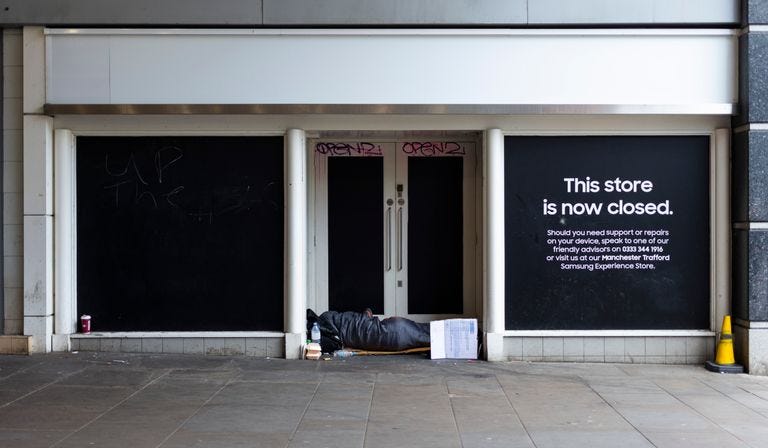I’d planned to write something this week about the practicalities of a maintaining a freelance journalism career in the midst of mass media lay-offs and online outlets collapsing. But, somewhat ironically given that my last post was about keeping on top of my workload, I’ve ended up with a mad bottleneck of deadlines and so it will have to wait.
In the meantime, I have a story out this week, in the latest issue of Prospect magazine. It looks at a growing body of research showing that direct money transfers can be transformative in the lives of homeless people. This research suggests that the most effective way to help people in crisis might be to simply give them some money and let them get on with it. But this idea is politically unpalatable, given the pervasive sense that poverty is down to a moral failing, and that people who are poor will spend irresponsibly. While reseaching the piece I found some particularly shocking examples of this:
In 2003, London-based homelessness charity Thames Reach launched a campaign called “your kindness could kill”, which encouraged people not to give money to people begging. The message was enthusiastically taken up by others, with posters displayed by Suffolk police in 2015 asking: “Could you spare 20p for a cup of tea? How about £10 for a bag of heroin? £12 for a rock of crack?”
But the evidence we have so far suggests that it is not at all true that homeless people will spend against their interests if they’re given a substantial cash injection: most people in crisis use the money to stabilise their situations. And the current, punitive approach is actually far more expensive for the public purse. I focused on Leigh Midwinter, who was evicted from a council flat after missing a rent payment of around £700. He became homeless, and was moved to temporary accommodation, which costs local authorities somewhere between £14,000 and £18,000 per person, per year. He stayed there for three years, during which time his physical and mental health suffered immensely. It was an awful ordreal for him, and it cost the council tens of thousands of pounds - all to recoup a payment of £700. When you look at it like this, the logic is clear.
Read the full story over at Prospect.
Reading/listening
This New York Times story about “mom-run” Instagram accounts for young female influencers is incredibly shocking and disturbing, but so sensitively reported. I particularly liked how they handled the issue of the imagery without compromising the girls’ privacy.
This piece by Alex Crawford, the veteran Sky foreign correspondent, arguing for foreign journalists to have access to Gaza, is important. I wonder why it’s only being said almost five months into the conflict.
If you spend any time whatsoever on Twitter (I can’t bring myself to call it X, sorry) you’ve probably already seen this article at The Cut about the financial-advice columnist who handed over $50,000 of savings in cash, in a shoebox, to a scammer, but if you haven’t, stop everything and read it.
This Guardian Long Read about the root causes of Hindu-Muslim violence in the UK town of Leicester a few years back is really fascinating.
The Runaway Princesses is an excellent four-part podcast series about attempts princesses of Dubai to escape. It’s based on this New Yorker story, which is well worth your time too.
I’ll be back in a couple of weeks with a return to usual service. Thanks so much for reading.





The National Zakat Fund in the UK also operates on cash grant basis for much of the same reasons highlighted in the article.
In respect of homelessness the UK Government’s policy of removing temporary accommodation from asylum seekers who obtain their ILR within 7 days, has contributed hugely to the crisis.